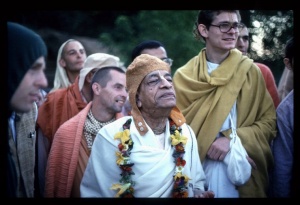SB 11.5.28

A.C. Bhaktivedanta Swami Prabhupada
Please note: The synonyms, translation and purport of this verse were composed by disciples of Śrīla Prabhupāda
TEXT 28
- taṁ tadā puruṣaṁ martyā
- mahā-rājopalakṣaṇam
- yajanti veda-tantrābhyāṁ
- paraṁ jijñāsavo nṛpa
SYNONYMS
tam — Him; tadā — in that age; puruṣam — the supreme enjoyer; martyāḥ — mortal men; mahā-rāja — a great king; upalakṣaṇam — playing the role of; yajanti — they worship; veda-tantrābhyām — according to both the original Vedas and ritual tantras; param — of the Supreme; jijñāsavaḥ — those who want to gain knowledge; nṛpa — O King.
Translation and purport composed by disciples of Śrīla Prabhupāda
TRANSLATION
My dear King, in Dvāpara-yuga men who desire to know the Supreme Personality of Godhead, who is the supreme enjoyer, worship Him in the mood of honoring a great king, following the prescriptions of both the Vedas and tantras.
PURPORT
When Lord Kṛṣṇa was leaving the city of Hastināpura, Arjuna personally held an umbrella over the Lord, and Uddhava and Sātyaki fanned the Lord with decorated fans (SB 1.10.17, 18). In this way, Emperor Yudhiṣṭhira and his followers worshiped Kṛṣṇa as the greatest of noble kings and as the Supreme Personality of Godhead. Similarly, at the Rājasūya sacrifice all of the great souls of the universe elected Kṛṣṇa as the King of all kings, the greatest personality, deserving of first worship. Such reverential worship of the Lord is characteristic of Dvāpara-yuga, as described in this verse (mahā-rājopalakṣaṇam). With each successive yuga, namely Satya, Tretā, Dvāpara and Kali, the condition of human society deteriorates more and more. As mentioned in this verse, the only favorable qualification of the residents of Dvāpara-yuga is that they are jijñāsavaḥ, strongly desirous of knowing the Absolute Truth. Otherwise there is no good qualification mentioned. The inhabitants of Satya-yuga were described as śāntāḥ, nirvairāḥ, suhṛdaḥ and samāḥ, or peaceful, free from envy, the well-wishers of every living entity, and fixed on the spiritual platform beyond the modes of material nature. Similarly the inhabitants of Tretā-yuga were described as dharmiṣṭhāḥ and brahma-vādinaḥ, or thoroughly religious, and expert followers of the Vedic injunctions. In the present verse, the inhabitants of Dvāpara-yuga are said to be simply jijñāsavaḥ, desiring to know the Absolute Truth. Otherwise they are described as martyāḥ, or subject to the weakness of mortal beings. If the human society of even Dvāpara-yuga was clearly inferior to that of Satya and Tretā-yugas, we can hardly imagine the truly disastrous condition of human society in Kali-yuga. Therefore, as will be mentioned in the following verses, human beings who have taken their birth in the present age of Kali should attach themselves rigidly to the movement of Caitanya Mahāprabhu to free themselves from foolishness.